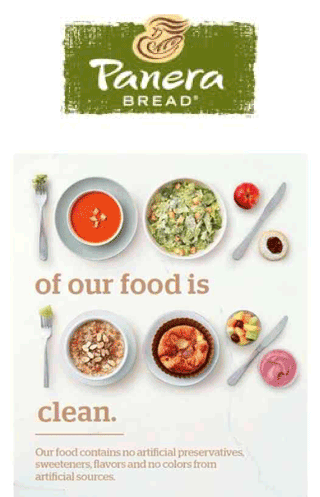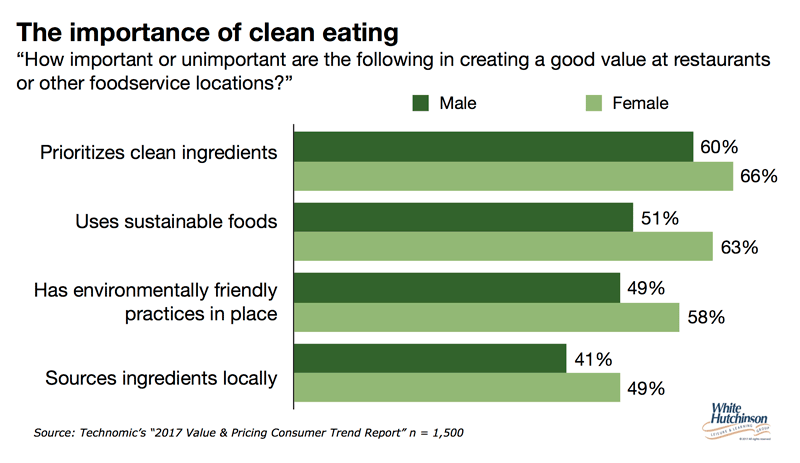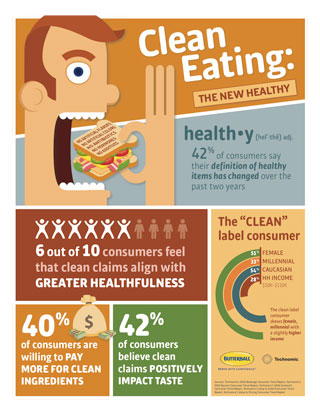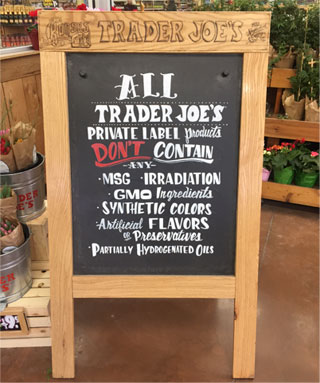
Vol. XVII, No. 7, November 2017
'Clean food' is the new norm
If you haven't noticed it yet, you sure need to, as a major trend is quickly going mainstream with consumers and changing their expectations and choices for their dining preferences and food purchases. It's known as clean food or free-from foods.

It all started a few years ago with the two fast casual restaurant chains Chipotle and Panera Bread. Panera recently completed its mission to makes its menu 100% clean cutting all 96 additives and ingredients the company identified on its "No No List" two years ago. Both chains educated consumers to all the unnatural additives foods have and introduced them to the option of eating clean food.
It's now a consumer-driven moment, demanding a return to real food and transparency through authenticity.
Today, many fast food chains including McDonald's, Taco Bell, Subway, Noodles & Co. and Pizza Hut and many consumer goods companies including Campbell Soup, Kraft, Nestle and General Mills are working hard to clean up their food offerings to appeal to evolved consumer demands.
According to the CEO of Campbell Soup, young consumers have driven a “seismic shift” in the food industry by desiring fresh, natural, and organic foods, as well as clean labels, prompting the brand to reshape their offerings.


All-natural, non-GMO and no additives or preservatives are the most common attributes consumers associate with clean foods. American consumers also connect farm grown, sustainably produced, minimally processed and made with real ingredients to the concept of clean food.

There is a health halo associated with clean foods. Consumers see fewer things in food as being better for them.
It's Baby Boomers who are driving the clean label trend and its attributes across food categories more than Millennials. Baby boomers basically look at clean food from a health perspective. Unlike Millennials, many Baby Boomers suffer far more from some sort of ailment, so they are in pursuit of higher quality of life for a longer period of time, making healthy eating that much more important to them.
The 2017 Food and Health Survey by the International Food Information Council Foundation found that for adults age 50+, free from artificial ingredients, preservatives or additives ranked 2nd in how they define healthy food after food high in healthy components or nutrients.
Millennials, rather than concerns about health, tend to focus on transparency on what is in the food, where it comes from and the farm's or supplier's practices.
Consumers expectations for the quality, the healthiness and the cleanliness of their food is being rapidly elevated by what they can find at fast food and fast casual restaurants as well a reformulated clean food products on supermarket shelves. The marketing by those restaurants and consumer goods companies is educating consumers about all the artificial and bad ingredients many foods include, including in processed foods. Presently we have clean food and other foods. Soon that will evolve to clean food and dirty food.
Implications for CLVs
Today, food and beverage offerings are a major driver of visits to community leisure venues of all types and produce significant revenues and profits. Now is the time to start thinking about whether you want your venue to gain the reputation of serving dirty food.


